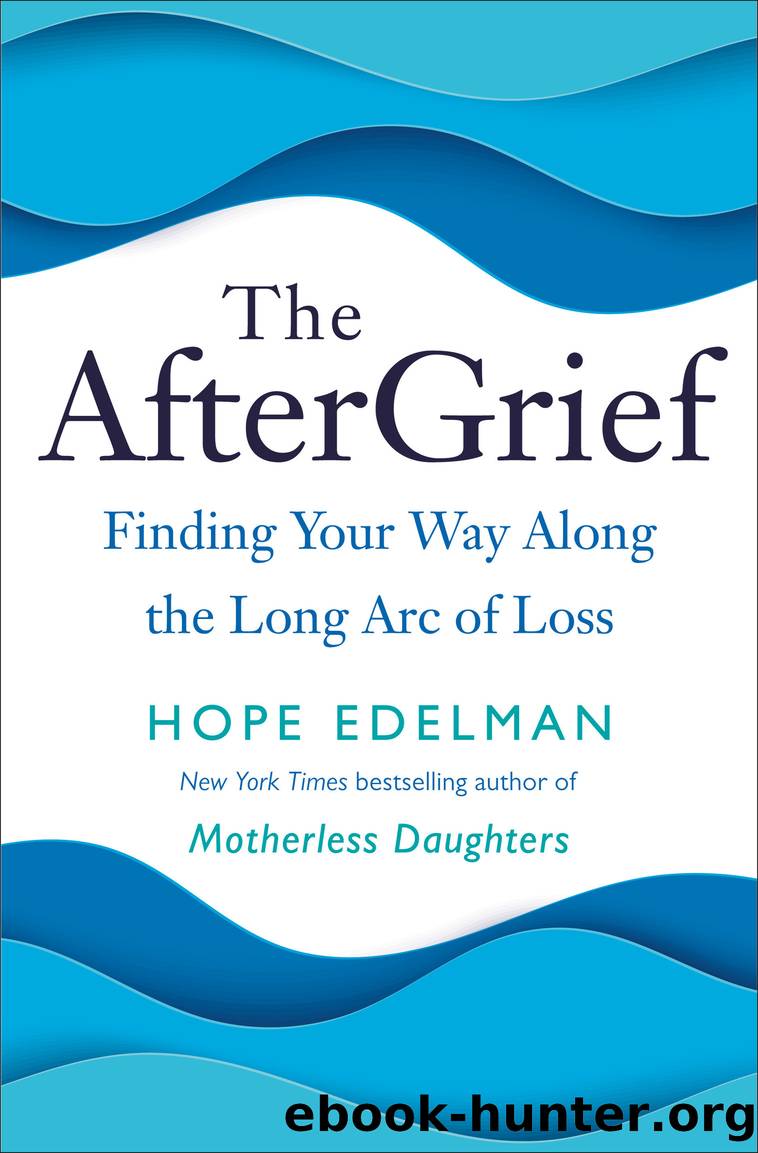The AfterGrief by Hope Edelman

Author:Hope Edelman [Edelman, Hope]
Language: eng
Format: epub
Publisher: Random House Publishing Group
Published: 2020-10-06T00:00:00+00:00
A Story Takes Shape
THIS WAS my original story of mother loss, which began forming in my mind soon after my mother died. I have a different story about losing my father in my fortieth year, and other stories for subsequent losses small and large. But the story of my first major loss is the one thatâs always held the most weight. Once youâve carried your mother to and from the bathroom or kissed her cool, gray forehead goodbye, you canât ever not have done those things. Once youâve discovered that human existence is a time-limited arrangement and for some that time will be short, you canât not know this ever again.
My motherâs early death saturated my worldview moving forward, set my early expectations for what others were likely to offer at times of distress, and became the narrative I returned to most frequently for reflection and revision as the years passed. That first death was the one that taught me how stories of loss develop and, later, how they change.
I donât remember sitting down after my mother died and thinking, âThis is the part where I create the story.â The process was much more involuntary than that. The human mind naturally gravitates toward the familiar comfort of narrative. Story, after all, is the vehicle through which we think, imagine, build relationships, make sense of our experiences, and form our identities. âNarrative is present in every age, in every place, in every society,â philosopher Roland Barthes has said. âIt begins with the very history of mankind and there nowhere is nor has been a people without narrative.â
A hunger for story echoes throughout every day. âHow did work go?â âWhat did you do at school?â âWhat symptoms did you notice and when?â âWhat happened to your car?â Birth stories, war stories, relationship stories: all narratives. Stories of setbacks, achievements, triumphs, surprises, and loss: more narratives. Weâre surrounded by story all the time.
Almost as soon as an experience endsâand sometimes even as itâs unfoldingâthe mind gets busy arranging selected facts, memories, and events into sequences across time to create stories with identifiable beginnings, middles, and ends. We cast our gaze backwards, seeking out cause-and-effect relationships, blazing a retroactive path to logically track movement from there to here. This happened, and then that happened, whichâoh, yeahâled to that, which made me feel this, which now I see helped me realize that.
Creating a coherent story in the aftermath of a death offers a sense of control over what may otherwise feel like a set of unmanageable events. âI was trying to gather information, that was my big thing,â says Evie, whose best friend died by suicide four years ago. âBecause I felt powerless. I wanted to piece together the what and why. Who knew? Why didnât anybody do anything? Was there a way we could have stopped it?â
Especially after a violent or random death, survivors often comb through memories and facts and details in their minds, looking for a point of entry where
Download
This site does not store any files on its server. We only index and link to content provided by other sites. Please contact the content providers to delete copyright contents if any and email us, we'll remove relevant links or contents immediately.
They Both Die at the End by Adam Silvera(8615)
Thirteen Reasons Why by Jay Asher(7793)
The Space Between by Michelle L. Teichman(6089)
Suicide Notes by Michael Thomas Ford(4274)
Tuesdays with Morrie by Mitch Albom(3833)
Suicide: A Study in Sociology by Emile Durkheim(2611)
The Checklist Manifesto by Atul Gawande(2205)
Tuesdays With Morrie by Mitch Albom(2173)
Robin by Dave Itzkoff(2007)
In the Woods by Tana French(2001)
Bossypants by Tina Fey(1988)
No Ashes in the Fire by Darnell L Moore(1982)
Reservoir 13 by Jon McGregor(1853)
End of Days by Sylvia Browne(1826)
Olive Kitteridge by Elizabeth Strout(1794)
Bus on Jaffa Road by Mike Kelly(1785)
All Things New by John Eldredge(1783)
Scar Tissue by Anthony Kiedis(1771)
No Time to Say Goodbye(1760)
